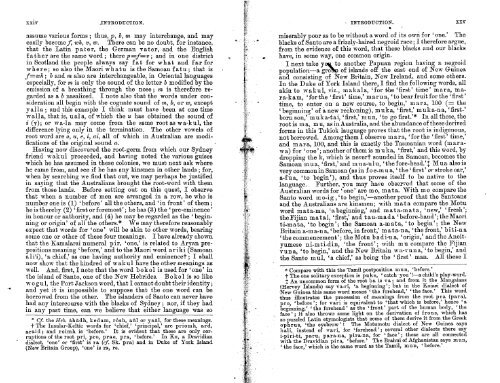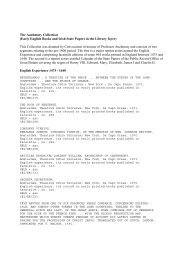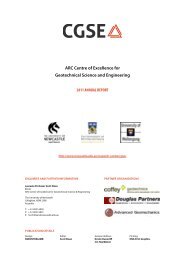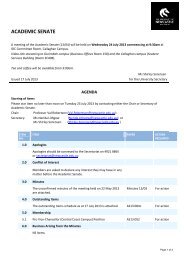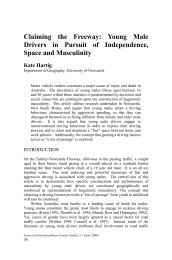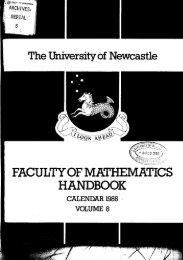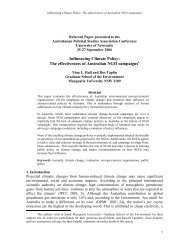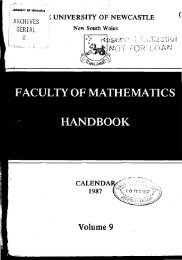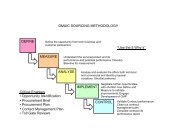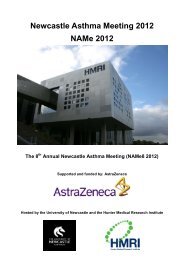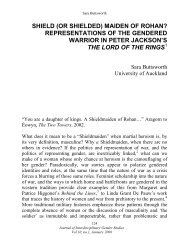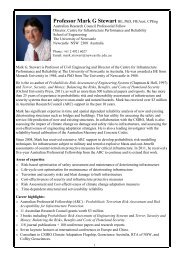n - University of Newcastle
n - University of Newcastle
n - University of Newcastle
You also want an ePaper? Increase the reach of your titles
YUMPU automatically turns print PDFs into web optimized ePapers that Google loves.
xiv ZNTRODUCTIOX.<br />
assume various forms ; thus, p, 6, nz may interchange, and may<br />
easily becomef, zuh, v, fu. There can be no doubt, for instance,<br />
that the Latin pater, the German vater, and the English<br />
father are the same mord ; there p=f=v ; and in one district<br />
in Scotland the people always say fat for what and far for<br />
where ; so also the Dlaori whatu is the Samoan f atu ; that is<br />
f=wA; b and tn also are interchangeable, in Oriental languages<br />
especially, for IZ is ocly the sound <strong>of</strong> the letter b modified by the<br />
emission <strong>of</strong> a breathing through the nose ; nt is therefore re-<br />
garded as a b nasalized. I note also that the words under con-<br />
sideration all begin mith the cognate sound <strong>of</strong> nz, b, or w, except<br />
yalla ; and this exalople I think must have been at one time<br />
malla, that is, uala, <strong>of</strong> which the tl has obtained the sound <strong>of</strong><br />
i (y); or ~va-la may come from the same root as wa-kul, the<br />
difference lying only in the termination. The other vowels <strong>of</strong><br />
root word are o, zc, e, i, ni, all <strong>of</strong> which in Australian are modi-<br />
fications <strong>of</strong> the original sound a.<br />
Having now discovered the root-germ from which our Sydney<br />
frieiicl makul proceeded, and having noted the various guises<br />
which he has assumed in these colonies, we must next ask where<br />
he came from, and see if he has any kinsmen in other lands ; for,<br />
when by searching we find that out, we may perhaps be justified<br />
in saying that the Australialls brought the root-word with them<br />
from those lands. Befbre setting out on this quest, I observe<br />
that when a number <strong>of</strong> men are arranged in a row, he who is<br />
number one is (1) 'before' all the others, and 'in front' <strong>of</strong> them ;<br />
he is thereby (2) 'first or foremost' ; he has (3) the ' pre-eminence'<br />
in honour or authority, and (4) he may be regarded as the 'begin-<br />
ning or origin' <strong>of</strong> all the others." We may therefore reasonably<br />
expect that words for 'one' will be akin to other words, bearing<br />
some one or other <strong>of</strong> these four meanings. I have already shown<br />
that the Kamalarai numeral pir, 'one,' is related to Aryan pre-<br />
positions meaning 'before,' and to the Maori word ariki (Samoan<br />
ali.i), 'a chief,' as one having authority and eminence? ; I shall<br />
now show that the kindred <strong>of</strong> wakul have the other meanings as<br />
well. And, first, I note that the word b o k 01 is used for 'one' in<br />
the island <strong>of</strong> Santo, one <strong>of</strong> the New Hebrides. Bokol is so like<br />
w o gul, the Port Jackson word, that I cannot doubt their identity;<br />
" and yet it is impossible to suppose that the one word can be<br />
borrowed from the other. The islanders <strong>of</strong> Santo can never have<br />
had any intercourse with the blacks <strong>of</strong> Sydney ; nor, if they had<br />
in any past time, can we believe that either language mas so<br />
* C' the Heb. LhZdh, kedam, rSsh, aQ1 or yap], for these meanings.<br />
t The Insular-Keltic: words for 'chief,' 'principal,' are prionl h, ard,<br />
araicl ; and roimh is 'before.' It is evident that these are only cor-<br />
ruptions <strong>of</strong> tile root pri, pro, prae, pra, 'before.' In Kn, a Dravidian<br />
' dialect, 'one' or 'first' is ra (cf. Sk. pra) and in Duke <strong>of</strong> Pork Island<br />
(New Britain Group), 'one' is ra, re.<br />
- INTBODUCTIOR.<br />
b .<br />
XSV<br />
miserably poor as to be without a word <strong>of</strong> its own for 'one.' The<br />
blacks <strong>of</strong> Santo are a frizzly-haired negroid race; I therefore argne,<br />
from the evidence <strong>of</strong> this word, that these blacks and our blacks<br />
have, in some may, one comnlon origin.<br />
I next take y to another Papuan region having a negroid<br />
population-a g& <strong>of</strong> islands <strong>of</strong>f the east end <strong>of</strong> New Guinea<br />
and consisting <strong>of</strong> New Britain, New Ireland, and some others.<br />
In the Duke <strong>of</strong> Pork Island there, I find the following words. all<br />
akin to makul, viz., makala, 'for the 'first' time' mara, mara-kam,<br />
'for the 'first' time,' marua, 'to bear fruit for the 'first'<br />
time, to enter on a new course, to begin,' mara, 100 (= the<br />
' beginning' <strong>of</strong> a new reckoning), muka, 'first,' muka-na, 'first-'<br />
born son,' muka-tai, 'first,' mun, 'to go first.'" In all these, the<br />
root is ma, mu, as in Australia, and the abundance <strong>of</strong> thesederived<br />
forms in this Tukiok lauguage proves that the root is indigenous,<br />
not borrowed. Among them I observe mara, 'for the 'first' time,'<br />
and mar a, 100, and this is exactly the Tasmanian word (mar a-<br />
ma) for 'one'; another <strong>of</strong>themis mul~a, 'first,' and this word, by<br />
dropping the k, which is never? sounded in Samoan, becomes the<br />
Samoan mua,. 'first,' and mua-ulu, 'the fore-head.'$ Mna also is<br />
very common in Samoan (as in f o e-mu a, ' the 'first' or stroke oar,'<br />
a-fua, 'to begin'), and thus proves itself to be native to the<br />
language. Further, you may have observed that some <strong>of</strong> the<br />
Australian words for ' one' are m o, m ata. With m o compare the<br />
Santo word rc o-ig , 'to begin,'-another pro<strong>of</strong> that the Santoans<br />
and the Australians are kinsmen; with mata compare the Motu<br />
word mata-ma, -a beginning,' and mat a-mat a, 'new,' ' fresh';<br />
theFijian matai, 'first,' and t nu-mada ' before-hand'; theMaori<br />
ti-mata, 'to begin'; the Samoan a-m ata, 'to begin'; the New<br />
Britain a-ma-na, 'before, in front,' mat a-na, 'the front,' biti-na<br />
'the commencement'; the illotu b adi-n a, 'origin,' and the Aneityumese<br />
ni-mti-din, 'the front'; mith nlu compare the IVjian<br />
vuna, 'to begin,' and the New Britain wa-runa, 'to begin,' and<br />
the Santo mul, 'a chief,' as being the ' first' man. All these I<br />
* Compare with this the Tamil postposition niun, 'before.'<br />
$ The one solitary exception is puke, ' catch you '!-a chllcl's play-word.<br />
$ An uncommon form <strong>of</strong> the root ba is va ; and from it the Rlauyaians<br />
(Hervey Islands) say va-ri, 'a beginning'; but in the Iioia,ri dialect <strong>of</strong><br />
New Guinea this same word means 'the forehead,' 'the face. This word<br />
thus illustrates the procession <strong>of</strong> meanings from the root pra (para),<br />
pry, 'before'; for vari is equivalent to 'that which is before,' hence 'a<br />
beying,' 'the forehead ' as the 'front ' part <strong>of</strong> the hnman body, 'the<br />
face ; it also throw3 some light on the derivation <strong>of</strong> frous, ~vl~ich has<br />
so puzzled Latin etymologists that some <strong>of</strong> tl~em derive it from the Greek<br />
ophrns, 'the eyebrow' ! The hlot~unotu dialect <strong>of</strong> New Guinea says<br />
hali, instead <strong>of</strong> vari, for 'forehead' ; several other dialects there say<br />
i-piri-ti, paru, para-na, pira-na, for 'face'; these are all connected<br />
with the Dravidian pira, 'before.' The Brahui <strong>of</strong> Afghanistan says mnn,<br />
' the face,' which is the same word as the Tamil, mun, ' before.'<br />
'


